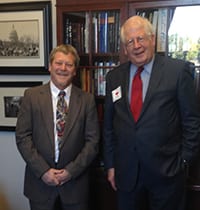News
President Stern Promotes Funding for Plant Research in DC
BTI President David Stern traveled to Washington D.C. last week to advocate for increased federal support for plant research.
The trip occurred in collaboration with the American Society for Plant Biologists, with the goal of enhancing ASPB’s impact on Capitol Hill, and to highlight the organization’s priorities for the 2016 fiscal year. ASPB is a scientific society formed in 1923, with almost 4,000 members. He also attended the ASPB Science Policy Committee meeting, where he presented an update on implementation of the plant research community’s strategic priorities, which are laid out in a document produced by ASPB in 2011 entitled, “Unleashing a Decade of Innovation in Plant Science: A vision for 2015-2025.” ASPB representatives referred to the “Decadal Vision” when explaining the importance of plant research to congressional members and their staff.
“Having the ‘Decadal Vision’ in hand as a consensus set of priorities for the plant research community is immensely powerful,” said Stern. Decision makers become engaged and excited about the possibilities when such a diverse group speaks with a single voice.”
Stern teamed up with Alan Jones, a professor of biology at the University of North Carolina at Chapel Hill and Crispin Taylor, ASPB’s Executive Director, to meet with representatives from various congressional offices. The team conducted meetings with staff from the offices of Representative David Rouzer from North Carolina, Representative Chris Gibson from New York and Senator Kirsten Gillibrand, also of New York. Both Rouzer and Gibson serve on the House Committee on Agriculture and Gillibrand serves on the Senate Committee on Agriculture, Nutrition and Forestry. Natalie Henkhaus also participated in these meetings. Henkhaus, currently a Molecular Biology and Genetics PhD candidate in Professor Eric Richard’s laboratory at BTI, will soon assume the role of Executive Coordinator of the National Plant Science Council, a plant science advocacy group formed to build on the goals of the “Decadal Vision.”
The ASPB team asked that Congress fund the National Science Foundation, Department of Energy, U.S. Department of Agriculture (USDA) and the National Institutes of Health at the levels recommended by ASPB, which are also those set by President Obama’s proposed budget. If approved, each of these agencies would each receive between a three and nine percent funding increase above 2015 levels. The president’s 2016 budget also would reflect significant increases to the Agricultural Research Service and the National Institute of Food and Agriculture.
“There has never been a better opportunity for plant scientists to help address the tremendous challenges in food, health and environment that the world faces,” said Stern. “Without sufficient investment, however, the discoveries that drive solutions will emerge from laboratories far too slowly. We are fortunate that support for basic research is bipartisan, but in an era of extreme political discord such rare areas of agreement risk being held hostage by unrelated disputes. It is more important than ever that the plant community continue to hone and deliver its positive message.”


